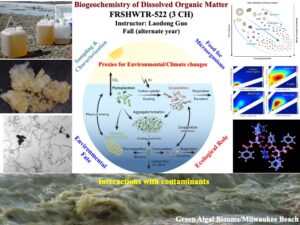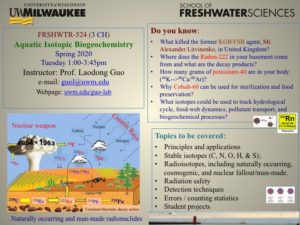Guo’s teaching in the School of Freshwater Sciences (SFS) at UWM includes the following courses:
- FRSHWTR-342: Water Pollution (3 Cr., Fall semester) This course was designed to provide students with an overview of the types of pollutants/contaminants in freshwater systems, their origins/sources, chemical properties, transformation, environmental fate, and transport in the water column and across different hydrological/environmental/biogeochemical interfaces (see learning outcome below).
- FRSHWTR-513: Field Experimentation and Analysis in Freshwater Sciences (3 Cr., Co-Teach, Fall semester): Course Objective: Student acquisition of comprehensive investigative procedures in biogeochemistry and freshwater ecology focusing on field and laboratory interactive assignments.
- FRSHWTR-514: Analytical Techniques in Freshwater Sciences (3 Cr., Spring semester), focus on hands-on experience in modern analytical/geochemical techniques (2/3) and nucleic acids/genomics principles and methods (1/3).
- FRSHWTR-522: Aquatic Biogeochemistry of Dissolved Organic Matter (3 Cr., As needed). This course focuses on the source, sink, chemical composition, molecular size distribution and biogeochemical cycling of dissolved and colloidal organic matter in the aquatic continuum, with an emphasis on biogeochemical processes at the soil-water, river-lake, and land-ocean interfaces.
- FRSHWTR-524: Introduction to Stable and Radioactive Isotopes (3 Cr., Spring semester/alternate year), including the principle and applications of both stable isotopes and radionuclides in aquatic environments
- FRSHWTR-999: Independent Studies (1-3 Cr. Spring&Fall), on laboratory techniques, experimental designs, and characterization of aquatic colloids and nanoparticles.
FRSHWTR-342 (UG/G): Water Pollution, Technology and Management (Fall semester)
- Understand dominant urban versus agricultural pollution sources and pollutants
- Understand concepts of chemical speciation and transformation of pollutants
- Understand sources and transport of legacy and emerging contaminants
- Understand the mechanics of water treatment and wastewater treatment technologies
- Understand strategies for removal and prevention
FRSHWTR-513 (G/UG): Field Experimentation and Analysis in Freshwater Water Sciences (Co-teach with other faculty members, Fall semester)
Field work will be required in addition to the scheduled lecture/lab for this course. Field trips will be scheduled mostly during the first 6 weeks aboard the R/V Neeskay and other small boats to provide ample opportunities for students to gain hands-on experience in using available field sampling devices/instruments, such as Niskin bottles, CDT, submersible pump, YSI sondes with multiple sensors/probes for water column vertical profiles, sediment box corer, ponar/piston samplers, plankton nets, Secchi disk, in-situ pumping system, ROV, Lidar and sidescan sonar for sea-bed mapping, and others. In addition to field trips and sampling, students will process and analyze hydrographic data and related field samples. Lectures will cover introduction to field programs, sampling devices/instruments, laboratory techniques/instruments, data processing/analysis, discussion, and student presentations (data analysis and mini research projects).
FRSHWTR-514 (G/UG): Analytical Techniques in Freshwater Sciences (Spring semester)
This is a 3 credit hours course with 2/3 (2 credit hours) in modern analytical/geochemical techniques and 1/3 (one credit hour) in nucleic acids/genomics principles and methods, co-taught with Dr. Ryan Newton. This course was designed to enhance students’ analytical skills and provide hands-on experience for graduate students, especial PSM students in the SFS/UWM. Undergraduate and graduate students from outside SFS are welcome.
FRSHWTR-522 (G/UG): Aquatic Biogeochemistry of dissolved organic matter (alternate year)
This is a 3 credit hours course focusing on the source, sink, chemical composition, molecular size distributions and biogeochemical cycling of natural organic matter in the aquatic continuum, with an emphasis on dissolved organic matter (DOM) and colloidal organic matter (COM) across different hydrological and biogeochemical gradients and/or biogeochemical processes at the soil-water, river-lake, and land-ocean interfaces”. The course is offered to students, both within and external to the School of Freshwater Sciences, who are interested in gaining knowledge of natural organic matter and its ecological/environmental roles in aquatic systems. Graduate and undergraduate students from freshwater sciences, biological/environmental science and geosciences will greatly benefit from this course. Contact Dr. Guo at guol@uwm.edu if you are interested or have questions.

FRSHWTR-524 (G/UG): Introduction to Stable and Radioactive Isotopes (alternate year)
This is a 3 credit hours introductory course and will cover the principles and applications of both stable and radioactive isotopes in aquatic systems. Isotopes are powerful tracers and proxies in understanding the chemical, biological, geological, hydrological and physicochemical processes in aquatic environments. Students will gain a holistic understanding of isotope biogeochemistry, radiation safety and dose, analytical techniques for the detection and measurements of isotopes, and applications of various isotopes. These include the use of traditional and non-traditional stable isotopes, naturally occurring radionuclides, and nuclear weapon fallout in tracing particle dynamics, food-web transfer, sediment chronology, hydrological cycle, pollutant transport, and biogeochemical processes in aquatic systems. Knowledge and skills gained from this course should provide a broad range of approaches that can be applied to student research projects or in the workplace. See a copy of course flyer below. Contact Dr. Guo, at guol@uwm.edu, if you are interested in this course or have questions.

FRSHWTR-999: Independent Studies
“Independent Studies” could be 1-3 credit hours depending on the need from a specific student. This course will cover modern laboratory techniques and/or current topics in Freshwater Sciences and Aquatic Biogeochemistry. See my webpage at https://uwm.edu/guo-lab/laboratory/ to see if you are interested in a specific laboratory technique. Contact Dr. Guo at guol@uwm.edu if you are interested or have questions.